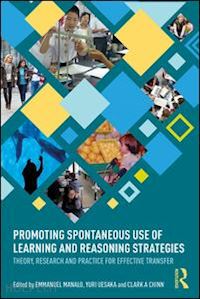Introduction (Emmanuel Manalo, Yuri Uesaka, & Clark Chinn) Part 1: Theory section1. Eliciting and Building upon Student-Generated Solutions: Evidence from Productive Failure (Manu Kapur, Ngan Hoe Lee, & June Lee)2. Promoting Learners’ Spontaneous Use of Effective Questioning: Integrating Research Findings Inside and Outside of Japan (Yoshinori Oyama)3. Learning from multiple documents: How can we foster multiple document literacy skills in a sustainable way? (Mark Stadtler, Rainer Bromme, & Jean-Francois Rouet)4. How to Address Student’s Lack of Spontaneity in Diagram Use: Eliciting Educational Principles for the Promotion of Spontaneous Learning Strategy Use in General (Yuri Uesaka & Emmanuel Manalo)5. Obstacles to the Spontaneous Use of Learning Strategies (and Some Approaches to Overcome Them) (Christof Wecker & Andreas Hetmanek) Part 2: Research section6. Second Language Vocabulary Learning: Are Students Cognitive Misers and, If So, Why? (Emmanuel Manalo & Marcus Henning)7. The Effect of Teaching Styles on Students’ Learning Strategy Use and Interest in Studying Science (Etsuko Tanaka)8. Effects of Students’ Perceptions of Test Value and Motivation for Learning on Learning Strategy Use in Mathematics (Masayuki Suzuki & Yuan Sun)9. Applying Metacognition Theory to the Classroom: Decreasing Illusion of Knowing to Promote Learning Strategy Use (Tatsushi Fukaya)10. Preparatory Learning Behaviors for English as a Second Language Learning: The Effects of Teachers’ Teaching Behaviors During Classroom Lessons (Keita Shinogaya)11. Developing Regulation Strategies through Computer-Supported Knowledge Building among Tertiary Students (Chunlin Lei & Carol Chan) Part 3: Practice section 12. Three Approaches to Promoting Spontaneous Use of Learning Strategies: Bridging the Gap Between Research and School Practices (Shin’ichi Ichikawa, Yuri Uesaka, & Emmanuel Manalo)13. Coding Dosage of Teachers’ Implementation of Activities Using ICAP: A Video Analysis (Glenda S. Stump, Na Li, Seokmin Kang, David Yaghmourian, Dongchen Xu, Joshua Adams, Katherine L. McEldoon, Matthew Lancaster, and Michelene T. H. Chi)14. Development and Improvement of a Learning Strategy Use Enhancement Program: Use of Lesson Induction and Elaboration Strategies (Mikiko Seo, Mengting Wang, Takeshi Ishizaki, Yuri Uesaka, & Shin’ichi Ichikawa)15. Epistemic Design: Design to Promote Transferable Epistemic Growth in the PRACCIS Project (ClarkChinn, Ravit Golan Duncan, & Ronald Rinehart)16. Exploring the scope and boundaries of inquiry strategies: What do young learners generalize from inquiry-based life science learning? (Ala Samarapungavan, Jamison Wills, & Lynn Bryan)17. PMC2E: Conceptual Representations to Promote Transfer (Cindy Hmelo-Silver, Rebecca Jordan, Suparna Sinha, Yawen Yu, & Catherine Eberbach)18. Dude, Don’t Start Without Me! Fostering Engagement with Others’ Mathematical Ideas (Noreen M. Webb, Megan L. Franke, Nicholas C. Johnson, Angela C. Turrou, and Marsha Ing)19. Supporting Teacher Use of Talk Moves During Inquiry Dialogue (Alina Reznitskaya, Ian A. G. Wilkinson, & Joseph Oyler) Conclusion (Emmanuel Manalo, Yuri Uesaka, & ClarkChinn)











